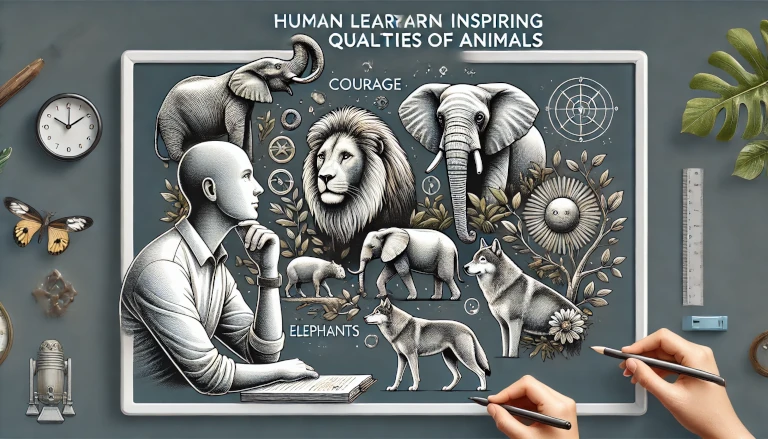Animals exhibit behaviors and traits that are not only fascinating but also provide valuable lessons for humans. From survival instincts to social cooperation, animals can teach us about adaptability, resilience, and living in harmony with nature. In this article, we explore the top 10 things humans should learn from animals, giving examples of specific species that embody these traits.
1. Adaptability: Learning from the Octopus 🐙
The octopus is a master of adaptability. It can change its color and texture to blend into its surroundings, helping it survive in different environments. Humans, too, must adapt to changing circumstances in life, whether it’s dealing with personal challenges or global changes like climate change.
Why Adaptability Matters:
- It helps us survive and thrive in diverse conditions.
- Encourages creativity and innovation in problem-solving.
2. Teamwork: Lessons from Ants 🐜
Ants work together in highly organized colonies, with each individual playing a specific role to support the greater good. Their cooperative efforts in building nests and gathering food demonstrate the power of teamwork. Humans can apply this lesson in workplaces and communities by collaborating to achieve common goals.
Advantages of Teamwork:
- Increases productivity and efficiency.
- Fosters a sense of belonging and shared purpose.
3. Persistence: The Determination of Salmon 🐟
Salmon are known for their incredible perseverance as they swim upstream to spawn, overcoming obstacles like fast currents and predators. This teaches us the value of persistence in reaching our goals, even when the journey is tough.
Benefits of Persistence:
- Helps us achieve long-term success.
- Builds resilience and strength of character.
4. Resilience: Learning from the Camel 🐪
The camel is built for resilience, surviving harsh desert conditions with little water or food. Humans can learn from the camel’s ability to endure hardship by building resilience in the face of life’s challenges, whether emotional, physical, or environmental.
Why Resilience is Important:
- Helps us recover from adversity.
- Encourages mental and emotional toughness.
5. Resourcefulness: The Crafty Crow 🦅
The crow is a highly intelligent bird known for its problem-solving abilities. Crows can use tools to get food, demonstrating resourcefulness. Humans can learn to use the resources available to them more efficiently, finding creative solutions to everyday problems.
Examples of Resourcefulness:
- Repurposing materials to reduce waste.
- Using technology to streamline tasks.
6. Leadership: Lessons from Wolves 🐺
Wolves exhibit remarkable leadership within their packs. The alpha wolf leads with strength and strategy, but also ensures the well-being of the entire pack. Humans can take cues from wolf leaders by balancing authority with care for their communities.
Benefits of Good Leadership:
- Promotes trust and respect.
- Inspires others to work towards a shared vision.
7. Patience: The Wisdom of the Turtle 🐢
Turtles embody patience with their slow, deliberate movements, yet they live long and fruitful lives. They teach humans that patience can lead to success over time, reminding us that not everything needs to happen quickly to be valuable.
Why Patience Matters:
- Reduces stress and anxiety.
- Leads to better decision-making and long-term success.
8. Loyalty: Lessons from Dogs 🐕
Dogs are known for their unwavering loyalty to their owners. This strong bond highlights the importance of loyalty in human relationships, whether with friends, family, or colleagues. Trust and loyalty build the foundation for meaningful connections.
Advantages of Loyalty:
- Strengthens relationships.
- Encourages reliability and trustworthiness.
9. Empathy: Learning from Elephants 🐘
Elephants are incredibly empathetic animals, showing concern for their family members and even other species. They demonstrate the importance of empathy in human interactions, teaching us to care for others’ well-being and offer support when needed.
Benefits of Empathy:
- Strengthens emotional bonds.
- Helps create a more compassionate and understanding society.
10. Moderation: The Balance of Bees 🐝
Bees work tirelessly to gather nectar but do not deplete their resources. They maintain balance in their ecosystem by practicing moderation. Humans, too, should learn to live sustainably, using resources wisely without overconsumption.
Importance of Moderation:
- Helps ensure long-term sustainability.
- Reduces waste and promotes a healthier planet.
Lessons from the Animal Kingdom 🌍🐾
Animals offer profound lessons that humans can apply in daily life, from resilience and resourcefulness to teamwork and loyalty. By observing and learning from animals, we can develop traits that enhance our personal and professional lives while promoting harmony with the environment. These lessons remind us that we are part of a larger ecosystem, and living in balance with nature is essential for our collective well-being.
By learning from animals like wolves, crows, and elephants, humans can embrace qualities like leadership, resilience, and empathy, improving our lives and relationships. 🌍
Discover more from Green Ecosystem - Renewable Energy, Agriculture, and Environmental Sustainability
Subscribe to get the latest posts sent to your email.


